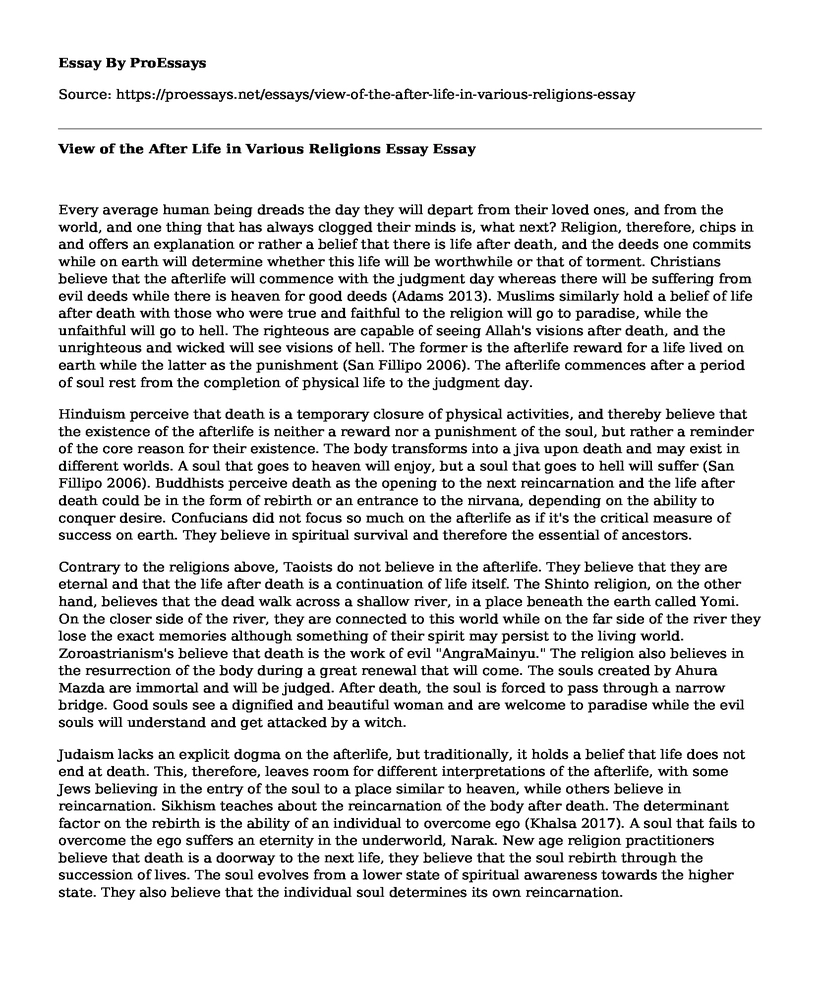Every average human being dreads the day they will depart from their loved ones, and from the world, and one thing that has always clogged their minds is, what next? Religion, therefore, chips in and offers an explanation or rather a belief that there is life after death, and the deeds one commits while on earth will determine whether this life will be worthwhile or that of torment. Christians believe that the afterlife will commence with the judgment day whereas there will be suffering from evil deeds while there is heaven for good deeds (Adams 2013). Muslims similarly hold a belief of life after death with those who were true and faithful to the religion will go to paradise, while the unfaithful will go to hell. The righteous are capable of seeing Allah's visions after death, and the unrighteous and wicked will see visions of hell. The former is the afterlife reward for a life lived on earth while the latter as the punishment (San Fillipo 2006). The afterlife commences after a period of soul rest from the completion of physical life to the judgment day.
Hinduism perceive that death is a temporary closure of physical activities, and thereby believe that the existence of the afterlife is neither a reward nor a punishment of the soul, but rather a reminder of the core reason for their existence. The body transforms into a jiva upon death and may exist in different worlds. A soul that goes to heaven will enjoy, but a soul that goes to hell will suffer (San Fillipo 2006). Buddhists perceive death as the opening to the next reincarnation and the life after death could be in the form of rebirth or an entrance to the nirvana, depending on the ability to conquer desire. Confucians did not focus so much on the afterlife as if it's the critical measure of success on earth. They believe in spiritual survival and therefore the essential of ancestors.
Contrary to the religions above, Taoists do not believe in the afterlife. They believe that they are eternal and that the life after death is a continuation of life itself. The Shinto religion, on the other hand, believes that the dead walk across a shallow river, in a place beneath the earth called Yomi. On the closer side of the river, they are connected to this world while on the far side of the river they lose the exact memories although something of their spirit may persist to the living world. Zoroastrianism's believe that death is the work of evil "AngraMainyu." The religion also believes in the resurrection of the body during a great renewal that will come. The souls created by Ahura Mazda are immortal and will be judged. After death, the soul is forced to pass through a narrow bridge. Good souls see a dignified and beautiful woman and are welcome to paradise while the evil souls will understand and get attacked by a witch.
Judaism lacks an explicit dogma on the afterlife, but traditionally, it holds a belief that life does not end at death. This, therefore, leaves room for different interpretations of the afterlife, with some Jews believing in the entry of the soul to a place similar to heaven, while others believe in reincarnation. Sikhism teaches about the reincarnation of the body after death. The determinant factor on the rebirth is the ability of an individual to overcome ego (Khalsa 2017). A soul that fails to overcome the ego suffers an eternity in the underworld, Narak. New age religion practitioners believe that death is a doorway to the next life, they believe that the soul rebirth through the succession of lives. The soul evolves from a lower state of spiritual awareness towards the higher state. They also believe that the individual soul determines its own reincarnation.
Conclusion
In any casual situation, life ends when a person stops breathing, but religion has equipped people with the belief that death is just a bridge to yet another life. This is with unexceptional Taoists who do not believe in afterlife other religion believe in reward for good deeds and punishment for lousy acts in this life. The day to day intercultural interactions makes it a necessity to study the different religious cultures of those we interact with, to avoid collisions, conflicts, and miscommunication. The study of the afterlife is as exciting as studying any other culture or beliefs by a group of people, and it proves a unifying factor to those that can identify with a similar belief. It is also a source of hope to the believers within these religions, as they are assured of a more valuable course to life, and a bonus added to them after the physical termination of life.
References
Adams S. L. (2013). Death and the Afterlife in Ancient Judaism and Early Christianity. Tabernacle-Baptist Death and the Afterlife.
Khalsa Sukhmandir (2017). What Doe Sikhs believe in the afterlife? Sikhism and salvation. Thought. https://www.thoughtco.com/sikhs-believe-about-the-afterlife-2993490
San Fillipo David (2006). Religious Interpretations of Death, Afterlife & Near Death Experiences. National Louis University. Faculty publications. Pp. 1-20
Cite this page
View of the After Life in Various Religions Essay. (2022, Jul 20). Retrieved from https://proessays.net/essays/view-of-the-after-life-in-various-religions-essay
If you are the original author of this essay and no longer wish to have it published on the ProEssays website, please click below to request its removal:
- Research Paper on Benefits and Costs of Being a Follower of Christ
- Experience in Saint Demetrios Greek Orthodox Church Essay
- Why the Desire to Teach at Christian Faith Centre Academy Essay
- Essay Sample on The Three Religions: Judaism, Christianity & Islamism
- Essay Example on Confucianism: A Vital Force in Arising China's Social Structures
- John Wesley: Reviving Christianity in the 18th Century - Essay Sample
- Essay Example on Jews & Christians: A New Dialogue







